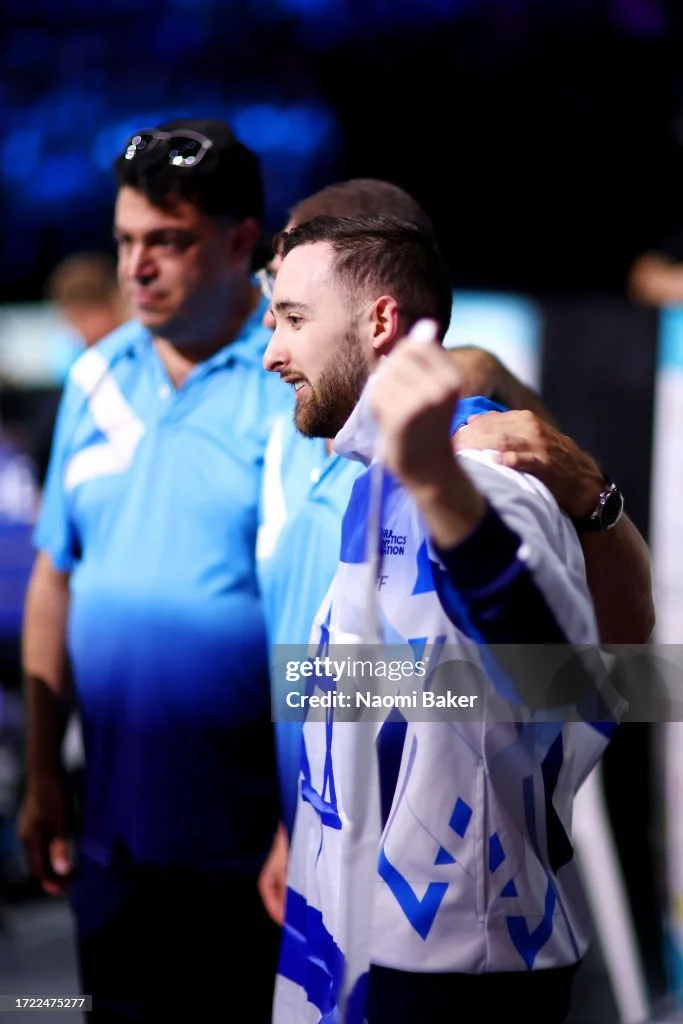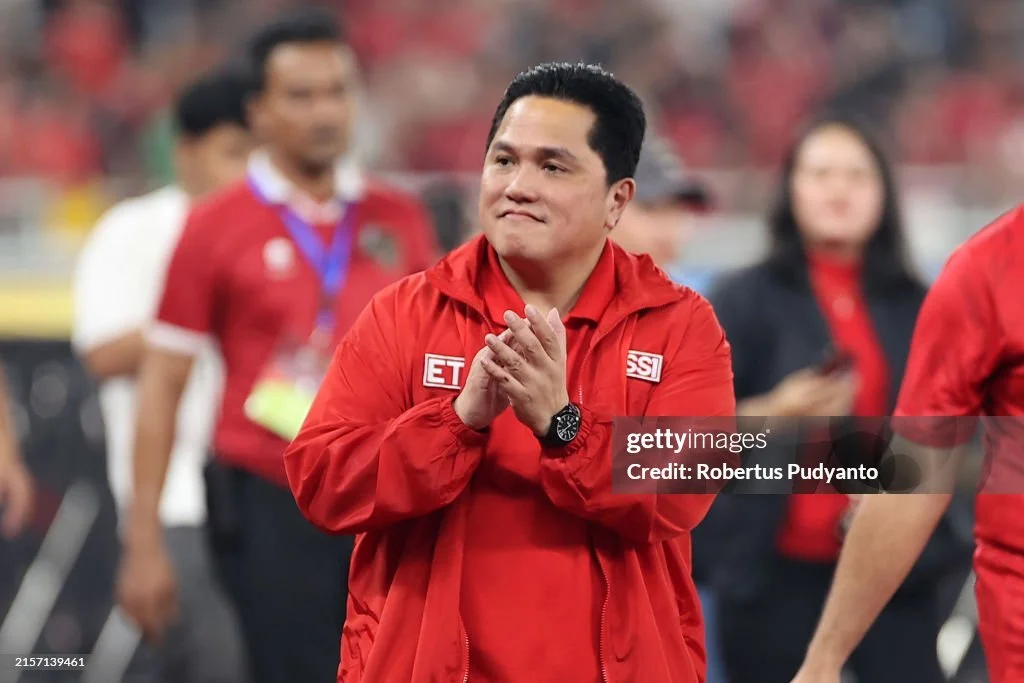Some 20 years ago, the International Olympic Committee would run a campaign before each edition of the Games called “Celebrate Humanity.”
Before the 2004 Athens Games, the IOC put out a booklet that said, in part, “Celebrate Humanity resonates with the truth that the Olympic ideals — the values of hope, friendship and fair play, dreams and inspiration, joy in effort — are universal, shared by all.”
Oct. 7, 2023: Artem Dolgopyat winning the gold medal at the world championships in Belgium // Getty Images
It’s not a celebration of humanity — all of us — when governments get to pick and choose who they like, or don’t.
All means all.
Except, now: the government of Indonesia is not allowing a six-member Israeli team to compete in the world gymnastics championships due to begin next week in Jakarta.
Among the Israelis: Artem Dolgopyat, gold medalist in the floor exercise at the Tokyo 2021 Games and silver medalist in Paris; he is the 2023 world champion in the event.
At a news conference in September, Kirsty Coventry, the IOC president, declared, “Now more than ever, our movement, the sports movement, has to showcase the good that is in humanity. And we believe now, more than ever, we need to re-affirm our commitment to peace and to remaining a beacon of hope, remaining a platform for athletes from around the world to be able to live out their dreams.”
Coventry was elected president in March, succeeding Thomas Bach. She formally took over in June.
The situation in Indonesia marks her first significant challenge.
What is she going to do?
What is the IOC going to do?
On Monday, the IOC said in comments printed by Tass, the Russian news service, then reprinted Wednesday by California-based Rich Perelman, who runs The Sports Examiner, “We are aware of various allegations regarding the Israeli national artistic gymnastics team’s participation in the upcoming World Championships in Indonesia. We are working to better understand the situation with all stakeholders.”
One can readily imagine why this situation might be of keen interest in Moscow, Tass noting Russian athletes are due to compete in Jakarta as “neutrals.”
It sets a terrible precedent if the Indonesians get away with excluding the Israelis.
For starters, the Indonesians are claiming solidarity with Palestine. But this is anti-Israel. Those are two very different things.
Dolgopyat, in an Instagram post, said, in part, that he was “shocked and saddened,” especially not to be able to “defend my [2023] world title, a title that I won on Oct. 7, one of the hardest days we have known as a nation.”
Next, the next time some government somewhere doesn’t like someone for whatever reason, it will be able to cite gymnastics in Indonesia in 2025. Anti-whoever? Whatever. What’s the consequence?
On Tuesday, the Israel Today newspaper reported, “Beyond the immediate damage to the team, there is growing concern that the decision will create a domino effect - and cause other countries to prevent Israeli athletes from entering international competitions, citing ‘security circumstances’ or following political pressure.”
This makes for an existential threat to the Olympic system. That’s not hyperbole. In a September 2023 speech, comments also noted in an item posted Wednesday to The Sports Examiner, Bach told the international federations their role is being undermined, “if not to say being attacked, by one or the other government.
“The autonomy of sport — your autonomy as an international sports federation — is under threat.”
Referring a few words later to what he called a “government takeover of international sport,” he said, “If they succeed with this, your role and the role of the Olympic movement would become obsolete.”
Coventry has been a proponent of consensus. This crisis illuminates a different proposition altogether — the ability of two IOC members to confidently assess that disinviting the Israelis is not enough to provoke significant pushback.
That assessment is weighed against the obvious: keeping the Israelis out is fundamentally at odds with the Olympic Charter and everything, the aspirational ideals, the Olympics and the IOC purport to stand for.
The two IOC members: Erick Thohir, the Indonesian sports minister, and Morinari Watanabe, a Japanese businessman who since 2017 has been head of FIG.
Watanabe was himself a candidate in the IOC presidential election that Coventry won.
Meanwhile, given that perception is sometimes as valid if not more so than reality, especially in the social media-driven world in which we all now operate, the optics here are beyond bad.
The IOC has long had a complex, one might say fraught, relationship with Israel.
For starters, Israel, geographically in western Asia, is considered “in” Europe for Olympic sports purposes, not Asia. Why? Because of friction with Muslim nations. The IOC has long accepted this fiction.
In 1972, of course, Palestinian terrorists sneaked into the Olympic village in Munich and then kidnapped and murdered 11 Israeli athletes and coaches.
Sept. 5, 1972, is considered the darkest day in Olympic history.
It took, though, until the opening ceremony of the Tokyo Olympics, in 2021, for there to be a moment of silence in memory of those murdered in 1972.
It took another year, the event’s 50th anniversary, in 2022, for an IOC president — Bach, who is German — to offer a public apology.
Did he apologize for what happened? No.
He apologized for the delay in honoring the victims of the attack.
“Everything that the Olympic Games stand for was shattered 50 years ago with the horrific attack on the Israeli Olympic team,” Bach said at a ceremony in Tel Aviv, apologizing for the years it took the IOC to commemorate the dead “in a dignified way.”
Over the many years, there have been innumerable incidents involving athletes from Muslim-majority nations — Iran, Algeria, Tunisia, more — who have drawn Israeli competitors and, citing injury or other excuse, withdrawn. This is kabuki theater. The real reason is that the Israelis are Israelis.
In response to these many incidents, the IOC has done nothing. In essence, it has set the stage — tacitly offering permission — for what is happening now in Indonesia.
What should the IOC do?
Fundamentally, it is not the IOC that is putting on the gymnastics championships but, instead, FIG. The IOC formally cannot make FIG do anything. And the easy IOC out would be to say, oh, this is FIG’s problem.
That’s true — but only to a point.
For one, the many IOC members who complained during the Bach presidency about being sidelined on essential issues should be vocal, either in public or behind the scenes, about the wrong in Indonesia that needs to be righted.
Indonesia’s Erick Thohir at a 2024 soccer match // Getty Images
That can happen without naming and shaming Thohir and Watanabe. Others can do that. Like here, in this column.
FIG president Morinari Watanabe // Getty Images
The FIG contract provides that entry visas “must be granted” to athletes. This is in keeping with the Olympic Charter.
If not, the contract says, the “allocation of the event would be canceled with immediate effect” by the FIG executive committee.
That has not happened.
The FIG executive committee met just last week. The meeting ended Oct. 10. Nothing.
Instead, that same day, the federation put out a statement saying it “takes note” of the Indonesian government’s move not to issue visas to the Israelis, and “recognizes the challenges” in hosting the event.
Predictably, the Israels sought relief from the Swiss-based Court of Arbitration for Sport. Equally predictably, that didn’t work; the court doesn’t have jurisdiction over governments.
After the CAS rejection, FIG issued another statement, this time proclaiming its “unwavering commitment to ensuring that all FIG competitions remain open to all eligible gymnasts …”
That is meaningless double-speak. The Israelis are without doubt eligible. So?
The IOC should insist that the 2025 gymnastics championships be moved out of Jakarta, even at this late moment.
It’s not as if there isn’t precedent — that again — for switching things up.
Amid the pandemic in 2020, many gymnastics events were canceled or postponed. The European championships, originally set for May 2020 in Azerbaijan, were moved to December and to Turkey. Any number of FIG World Cup series events were pushed back to 2021.
The IOC should insist, too, that the Indonesian government bear the costs to switch the championship out of Jakarta.
If the Indonesians or FIG balk, the IOC has two points of leverage:
Indonesian officials have been vocal about bidding for the Summer Games in 2036. That has to be made a very public non-starter unless and until the Indonesian authorities agree to celebrate all humanity. Beyond, the IOC needs to make clear to every single federation under its umbrella that Indonesia is a no-go host until the government agrees it not only can but will admit everyone.
Of course, the real leverage the IOC has with FIG is money.
The IOC runs a development program called Solidarity. Solidarity funds to Indonesia’s national Olympic committee should be frozen.
More, the gymnastics federation is heavily dependent on IOC-derived revenue — in particular, the FIG share of IOC-supplied television revenues over every four-year Olympic cycle.
Three Summer Games federations get the largest chunk of such revenue — gymnastics, swimming, track and field.
Track and field and swimming have made significant gains in recent years in lessening financial dependence on the IOC.
Not so FIG.
As its annual reports make clear, and as Perelman pointed out in a June Sports Examiner column, FIG “absorbs big income in the year of an Olympic Games from the IOC television revenue, then spends down over the next three years until the next IOC transfer comes.”
For 2024, for instance, FIG had total revenues of about $19 million against $24.1 million in expenses — a loss of about $5 million.
It’s so simple. FIG needs IOC money. The IOC should withhold it until FIG does what is right.
Because what’s happening in Indonesia is very, very wrong.
Going back to Coventry’s comments in September, the IOC simultaneously put out a statement saying it was convening a working group aimed at “ensuring that the IOC, the Olympic Games and sport remain politically neutral and can uphold their mission to unite the world in peaceful competition.”
She said then, “How are we going to reaffirm our commitment to the sports movement, as the IOC, as sports and as the Olympic Games to be able to continue to promote peace and unity?”
It’s not complicated. All means all.




